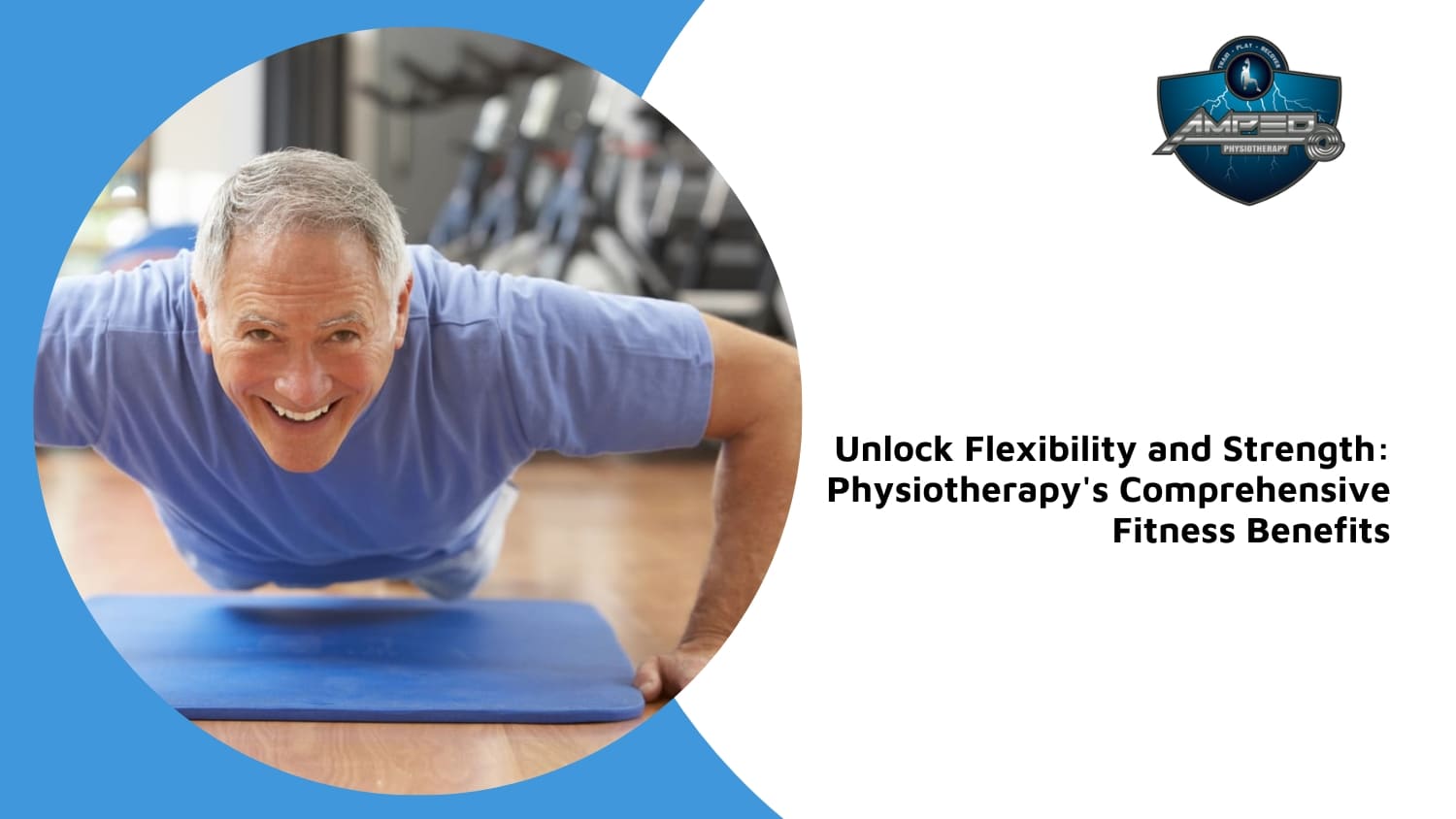Physiotherapy is often associated with injury recovery and rehabilitation, but its benefits extend far beyond these areas, playing a pivotal role in enhancing general fitness. With a focus on improving movement, flexibility, and overall physical health, physiotherapy can be a powerful tool for anyone looking to optimize their fitness journey. In this blog, we will explore how physiotherapy supports various aspects of fitness, including strength, endurance, cardiovascular health, weight management, flexibility, and post-workout recovery, while also highlighting the techniques used by physiotherapists to help individuals achieve their fitness goals.
Benefits of Physiotherapy for General Fitness
Physiotherapy is instrumental in improving general fitness by addressing specific physical needs and enhancing overall well-being. Here are some ways physiotherapy contributes to general fitness:
- Injury Prevention: Physiotherapists assess movement patterns and identify areas of weakness or imbalance, providing exercises and advice to prevent injuries before they occur.
- Pain Management: Through targeted treatments such as manual therapy and exercise prescription, physiotherapy can alleviate pain, allowing individuals to engage in physical activities without discomfort.
- Improved Functionality: By enhancing joint mobility and muscle function, physiotherapy helps improve daily movement efficiency, leading to better performance in fitness activities.
- Customized Exercise Programs: Physiotherapists develop personalized exercise plans tailored to individual fitness levels and goals, ensuring a balanced and effective approach to fitness.
- Enhanced Flexibility: Stretching and mobility exercises prescribed by physiotherapists can improve flexibility, which is crucial for overall fitness and injury prevention.
- Posture Correction: Addressing postural imbalances can relieve strain on the body, enhancing exercise performance and reducing the risk of injury.
- Holistic Approach: Physiotherapy considers the whole body and mind, promoting overall health and well-being beyond just physical fitness.
The benefits of physiotherapy for general fitness are extensive. By focusing on prevention, pain management, and personalized care, physiotherapy ensures that individuals can pursue their fitness goals safely and effectively.
Building Strength and Endurance: The Role of Physiotherapy
Building strength and endurance is a critical component of fitness, and physiotherapy plays a significant role in this area. Here are some ways physiotherapy supports strength and endurance:
- Strength Training Programs: Physiotherapists design strength training routines that are safe and effective, focusing on specific muscle groups and ensuring proper form to maximize gains.
- Endurance Building Exercises: Cardiovascular exercises prescribed by physiotherapists can improve endurance, enabling longer and more intense workouts.
- Progressive Overload: Physiotherapy incorporates the principle of progressive overload, gradually increasing exercise intensity to build strength and endurance without risking injury.
- Functional Strength: By focusing on functional movements, physiotherapy helps strengthen muscles used in daily activities, improving overall physical capacity.
- Balance and Coordination: Exercises that enhance balance and coordination contribute to better overall strength and endurance by ensuring stability during physical activities.
- Muscle Recovery: Physiotherapy techniques aid in muscle recovery, allowing individuals to train harder and more frequently without the setbacks of fatigue or injury.
By focusing on tailored exercise programs and recovery techniques, physiotherapy effectively supports the development of strength and endurance, crucial for maintaining a robust fitness level.
Physiotherapy vs. Personal Training: What’s the Difference?
While both physiotherapy and personal training aim to improve physical fitness, they differ in their approaches and objectives. Here are the key differences:
- Medical Expertise: Physiotherapists have medical training that allows them to address injuries and medical conditions, while personal trainers focus primarily on fitness and exercise.
- Rehabilitation Focus: Physiotherapy often involves rehabilitation from injury or surgery, whereas personal training is more centred on fitness and performance enhancement.
- Assessment Techniques: Physiotherapists use comprehensive assessments to identify physical limitations or imbalances, while personal trainers focus on fitness assessments to gauge current fitness levels.
- Personalized Treatment Plans: Physiotherapists create treatment plans based on medical needs, while personal trainers develop workout plans based on fitness goals.
- Holistic Health Approach: Physiotherapy addresses overall health, including pain management and functional improvement, whereas personal training focuses more on physical fitness and appearance.
- Approach to Exercise: Physiotherapists may prescribe specific exercises to aid recovery and improve function, while personal trainers emphasize general fitness exercises for strength and endurance.
Understanding these differences can help individuals decide whether physiotherapy or personal training is more suitable for their fitness objectives, especially if medical issues are a concern.
Physiotherapy and Cardiovascular Fitness: Understanding the Connection
Physiotherapy can indeed support cardiovascular fitness through various tailored interventions. Cardiovascular fitness is crucial for overall health, involving the efficient functioning of the heart, lungs, and circulatory system. Physiotherapists can design exercise programs that improve cardiovascular endurance, focusing on activities that elevate heart rate and enhance aerobic capacity. These programs are customized to fit individual health status and fitness levels, ensuring safety and effectiveness.
Moreover, physiotherapists often incorporate interval training, which alternates periods of high-intensity exercise with recovery, proven to significantly improve cardiovascular health. They also educate people on the importance of regular physical activity and provide strategies to incorporate it into daily routines, making cardiovascular fitness more achievable. By monitoring progress and adjusting exercises, physiotherapists ensure clients are challenged but not overwhelmed, maximizing cardiovascular benefits. Thus, physiotherapy not only aids in recovering from cardiovascular issues but also in promoting overall heart health and endurance.
Can Physiotherapy Support Weight Loss and Body Composition Goals?
Achieving weight loss and optimizing body composition are common fitness goals, and physiotherapy can play a crucial role in this journey. Here’s how:
- Metabolic Boost: Physiotherapy exercises can increase metabolic rate, aiding in calorie burning and weight loss.
- Fat Loss Strategies: By encouraging activities that promote fat loss, physiotherapy supports healthy body composition changes.
- Resistance Training: Building muscle through resistance training increases basal metabolic rate, contributing to weight management.
- Nutritional Guidance: While not primary nutritionists, physiotherapists can offer basic advice on healthy eating to complement exercise efforts.
- Lifestyle Changes: Physiotherapy promotes sustainable lifestyle changes that support long-term weight management and body composition goals.
- Behavioural Coaching: Physiotherapists can help motivate and guide individuals, reinforcing positive behaviours that lead to weight loss success.
Physiotherapy offers a comprehensive approach to weight management, focusing on exercise, lifestyle, and behavioural changes that support long-term health and fitness goals.
Is Physiotherapy Beneficial for Post-Workout Recovery?
Yes, physiotherapy is highly beneficial for post-workout recovery, offering techniques that can accelerate healing and reduce muscle soreness. After intense physical activity, muscles can experience micro-tears and inflammation. Physiotherapy addresses these issues through various methods. Techniques such as massage therapy and myofascial release are used to alleviate muscle tightness and improve circulation, facilitating faster recovery.
Additionally, physiotherapists may incorporate active recovery exercises, which involve low-intensity movements that help maintain blood flow and reduce stiffness. Ice therapy and compression can also be used to minimize swelling and discomfort. Furthermore, physiotherapy provides education on proper hydration and nutrition, which are critical for effective recovery. By utilizing these strategies, physiotherapy not only aids in quicker recovery but also prepares the body for future workouts, ensuring continuous improvement in fitness levels without prolonged downtime from injuries or soreness.
Athletic Performance Optimization: How Physiotherapy Helps
Athletes can greatly benefit from physiotherapy when it comes to optimizing their performance. Here’s how physiotherapy supports athletic excellence:
- Injury Prevention Strategies: Physiotherapists provide education and exercises that help athletes avoid injuries, ensuring they stay in top form.
- Performance Analysis: Through biomechanical assessments, physiotherapists identify areas for improvement, enhancing athletic performance.
- Customized Training Programs: Tailored exercise routines are developed to target specific athletic goals, optimizing strength, speed, and agility.
- Recovery Techniques: Physiotherapy offers advanced recovery methods, such as cryotherapy and hydrotherapy, to reduce downtime between training sessions.
- Mental Preparation: Physiotherapy supports mental resilience through stress management techniques, crucial for high-pressure competitive environments.
- Nutritional Support: While not dieticians, physiotherapists can offer basic dietary advice to improve energy levels and recovery.
Physiotherapy provides athletes with a comprehensive approach to performance optimization, addressing physical, mental, and nutritional aspects to help them achieve peak performance.
Techniques Physiotherapists Use to Support Fitness Goals
Physiotherapists employ a variety of techniques to support fitness goals, each tailored to address specific needs and objectives:
- Manual Therapy: This hands-on approach improves mobility and reduces pain, facilitating smoother movement during exercise.
- Exercise Prescription: Customized exercise plans are developed to target strength, endurance, and flexibility, aligned with individual fitness goals.
- Electrotherapy: Techniques like ultrasound and electrical stimulation enhance healing processes, supporting faster recovery and improved performance.
- Education and Advice: Physiotherapists provide guidance on posture, ergonomics, and lifestyle choices that support fitness and prevent injury.
- Taping and Bracing: These methods provide support and stability, allowing individuals to perform exercises safely while recovering from injuries.
- Hydrotherapy: Water-based exercises reduce strain on joints and muscles, offering a low-impact alternative to traditional workouts.
These techniques demonstrate the multifaceted approach physiotherapists take to support fitness goals, ensuring that individuals can safely and effectively pursue their desired levels of physical health and performance.
Let Us Help You Reach Your Fitness Goals
Physiotherapy offers a comprehensive, tailored approach to enhancing fitness, supporting various aspects from strength and endurance to flexibility and recovery. Its holistic nature ensures that individuals can achieve their fitness objectives safely and effectively. For those seeking to optimize their fitness journey, Amped Physiotherapy in Ottawa offers guidance and personalized programs to meet your unique needs.
Whether you’re aiming to prevent injury, improve cardiovascular health, or enhance athletic performance, our team is here to support you every step of the way. Contact us today to begin your journey towards improved health and fitness.









